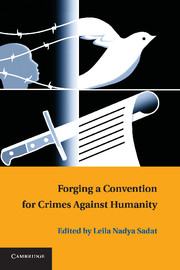Book contents
- Frontmatter
- Contents
- Figures and Maps
- Crimes Against Humanity Initiative: Steering Committee
- Biographies of Contributors
- Foreword
- Preface and Acknowledgments
- Crimes Against Humanity and the Responsibility to Protect
- 1 History of Efforts to Codify Crimes Against Humanity
- 2 The Universal Repression of Crimes Against Humanity before National Jurisdictions
- 3 Revisiting the Architecture of Crimes Against Humanity
- 4 The Bright Red Thread
- 5 Gender-Based Crimes Against Humanity
- 6 “Chapeau Elements” of Crimes Against Humanity in the Jurisprudence of the UN Ad Hoc Tribunals
- 7 The Definition of Crimes Against Humanity and the Question of a “Policy” Element
- 8 Ethnic Cleansing as Euphemism, Metaphor, Criminology, and Law
- 9 Immunities and Amnesties
- 10 Modes of Participation
- 11 Terrorism and Crimes Against Humanity
- 12 Crimes Against Humanity and the International Criminal Court
- 13 Crimes Against Humanity and the Responsibility to Protect
- 14 Re-enforcing Enforcement in a Specialized Convention on Crimes Against Humanity
- 15 Why the World Needs an International Convention on Crimes Against Humanity
- Appendices
- Testimonials and Endorsements
- Index
- References
8 - Ethnic Cleansing as Euphemism, Metaphor, Criminology, and Law
Published online by Cambridge University Press: 01 June 2011
- Frontmatter
- Contents
- Figures and Maps
- Crimes Against Humanity Initiative: Steering Committee
- Biographies of Contributors
- Foreword
- Preface and Acknowledgments
- Crimes Against Humanity and the Responsibility to Protect
- 1 History of Efforts to Codify Crimes Against Humanity
- 2 The Universal Repression of Crimes Against Humanity before National Jurisdictions
- 3 Revisiting the Architecture of Crimes Against Humanity
- 4 The Bright Red Thread
- 5 Gender-Based Crimes Against Humanity
- 6 “Chapeau Elements” of Crimes Against Humanity in the Jurisprudence of the UN Ad Hoc Tribunals
- 7 The Definition of Crimes Against Humanity and the Question of a “Policy” Element
- 8 Ethnic Cleansing as Euphemism, Metaphor, Criminology, and Law
- 9 Immunities and Amnesties
- 10 Modes of Participation
- 11 Terrorism and Crimes Against Humanity
- 12 Crimes Against Humanity and the International Criminal Court
- 13 Crimes Against Humanity and the Responsibility to Protect
- 14 Re-enforcing Enforcement in a Specialized Convention on Crimes Against Humanity
- 15 Why the World Needs an International Convention on Crimes Against Humanity
- Appendices
- Testimonials and Endorsements
- Index
- References
Summary
INTRODUCTION
Euphemistic uses of the concept of ethnic cleansing are often traced to “the burning tradition” in the Balkans and the “final solution” in Nazi Germany. In this chapter, we review the origins of these euphemisms and consider how they form a backdrop for understanding the further metaphorical influence of the imagery of ethnic cleansing. Cherif Bassiouni and an international commission of experts revealed the incriminating influence of ethnic cleansing as an activating metaphor, and in this way turned the understanding of the term on its head. The result was to spur an international response to the massive and ongoing atrocities in the former Yugoslavia. We examine the further evolution of a social scientific understanding of ethnic cleansing as a topic of criminological study – a topic that is now evolving alongside the law of ethnic cleansing and genocide in the current epicenter of mass atrocity: Darfur.
This discussion requires that we enumerate the meaning and elements of ethnic cleansing. In doing so, we adopt a distinction between “atrocity crime” and “atrocity law” as advanced by David Scheffer. Accordingly, we distinguish the “criminology of mass atrocity” from “the law of atrocity.” The criminology of mass atrocity involves the social scientific study of the precursors of ethnic cleansing, although it may also involve studying factors influencing whether and when these crimes will be legally prosecuted.
- Type
- Chapter
- Information
- Forging a Convention for Crimes against Humanity , pp. 177 - 201Publisher: Cambridge University PressPrint publication year: 2011
References
- 1
- Cited by



